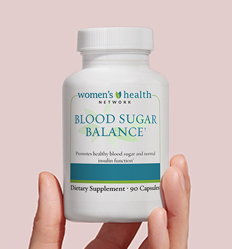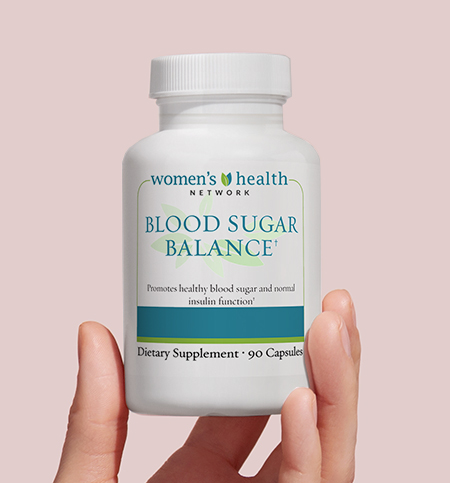Authored by Caroline Morin
What do you think of when you think of processed foods?
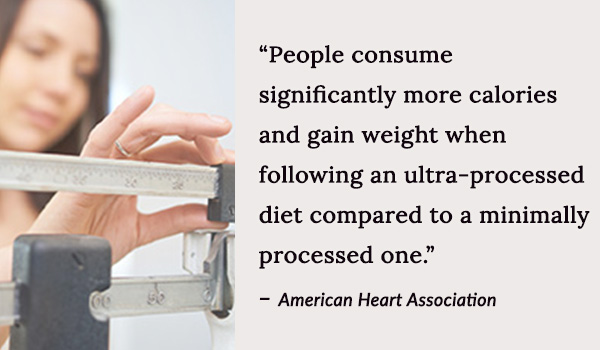
Fast food, chips, sodas and candy probably come to mind. But did you know that ultra-processed ingredients are often hidden in products that are marketed as health foods — like organic gluten-free chicken nuggets, low-fat cream cheese, yogurt, salad dressing or plant-based coffee creamer?
Ultra-processed foods are constantly creeping onto grocery store shelves and this isn’t by chance. It’s by the intentional design of “Big Food,” the multinational food and beverage industry that wields huge, concentrated market power. What we eat is increasingly driven by a small handful of large corporations. And these foods are impacting our health in ways we are only just beginning to understand.
This article explores the four main ultra-processed products created by Big Food and how these ingredients are adversely affecting our health – from triggering inflammation and food addiction to weight gain, disease risk and hormonal imbalance.
This is information that Big Food hopes you would never find out, and could be the key to you taking back control so you can make food and dietary choices that result in greater health and wellness.
4 ultra-processed food ingredients that are harming your health
Processed food is defined as food that has been changed in any way from its natural state. Some processing is beneficial and necessary. Minimal processing such as washing and chopping keeps our food affordable and more convenient. Think bagged spinach, chopped vegetables and shelled nuts.

Additional processing such as canning, heating or cooling keeps our food safer and fresher longer. Think of pasteurized milk, canned tomatoes and tuna. And freezing fruit and veggies locks in nutrients and allows us availability to a greater variety of healthy foods out of season.
But, the more highly processed foods are, the less nutritional value they offer. Alarmingly, new research reveals that 73% of our food supply is “ultra-processed,” meaning the majority of our food supply contains many added ingredients including chemicals and preservatives, or is made from substances extracted from foods such as fats, starches, sugars and hydrogenated fats. Not only are these foods less nutritious, they are increasingly linked to making us fat and sick.
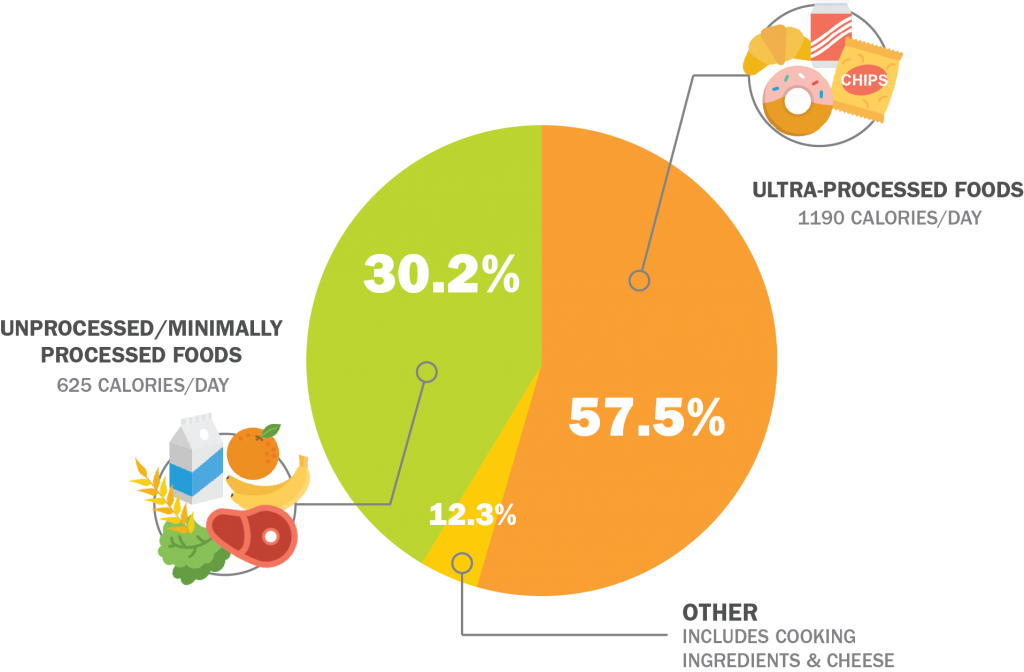
What “Big Food” doesn’t want you to know about …
Refined grains
Grains such as wheat, rice and corn are some of the most commonly consumed foods in the world. While whole grains are linked to numerous health benefits, many of the products in our standard American diet are made from refined grains.
Refining grain involves removing the outer layer of fiber which consequently strips the grain of nutrients, vitamins and minerals. The only thing left is a rapidly digestible starch and a small amount of protein.
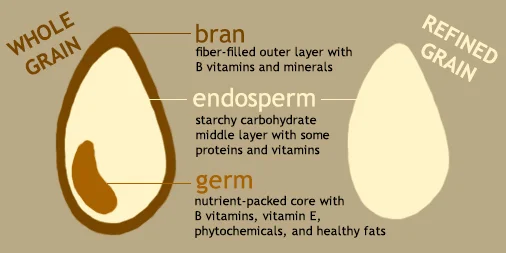
As a result of being stripped, refined grains have a high glycemic index, meaning they lead to a rapid spike in blood sugar and insulin levels. About an hour after eating, these blood sugar levels plummet, promoting hunger and stimulating the part of the brain associated with rewards and pleasure. The addiction part of our brain is triggered and we begin a vicious cycle of craving and overeating.
This rapid rise and fall in blood sugar results in inflammation and high levels of triglycerides, which impact our hormones. One such hormone scientists are paying more attention to is leptin.
Leptin is produced in the body’s fat cells and plays several roles. Its key function is to tell the brain when to stop eating and burn calories at a normal rate. This is why it’s known as the “satiety hormone.”
When the body has too much leptin, it can become leptin resistant. No matter how much leptin is produced, the brain doesn’t get the signal to stop eating. In fact, it can instead think that the body is starving. So the brain sets forces into motion to encourage the body to eat more and conserve energy.
For people with leptin resistance, willpower to “eat less and exercise more” becomes a losing battle. We can’t fight the evolutionary processes that kept us alive for most of human history. More fat accumulates, more leptin is created and the cycle of overeating continues.
Added fats
Fat is a necessary macronutrient. Fat provides energy, supports cell function and is needed to absorb nutrients and produce hormones.
But added and processed fats lead to trouble.
We all know by now to avoid hydrogenated oils and trans fat. These processed fats are known to raise cholesterol levels and are linked to heart disease. The FDA has even taken steps to remove artificial trans fats from foods.
While that’s great news, we still have to watch out for the fats we consume to make sure we are providing our bodies the good fats we need.

Our bodies need a ratio of 1:1 Omega-3 and Omega-6 polyunsaturated fats in order to rebuild our cells and produce hormones properly.
However, processed vegetable and seed oils, including cottonseed oil, palm oil and soybean oil, have very high concentrations of Omega-6 to Omega-3s. Omega-6 fatty acids synthesize prostaglandins, lipid compounds which have hormone-like effects. High levels of Omega-6 may contribute to inflammation if not balanced out with Omega-3s, which we generally get far less of in our typical modern diets. Omega-3s are primarily found in fish and in some plants such as seaweed, flax, chia, walnuts and soybeans.
Added sugars
Sugar impacts our bodies in numerous ways by:
- turning off appetite control systems
- overloading the liver which converts carbohydrates to fat leading to a greater accumulation of fat in the liver called nonalcoholic fatty liver disease (NAFLD) affecting 10-20% of Americans
- raising blood pressure
- contributing to cognitive decline
- causing a greater risk for depression
- contributing to many types of cancer
- promoting skin aging: Diets high in refined carbs and sugar produce advanced glycation end products, known as AGEs, which are compounds formed by reactions between sugar and protein that damage collagen and elastin
And It’s Not Just Sugar
There are currently over 60 names for sugar that can show up in the ingredients label. Look for words like
- corn syrup solids
- crystal dextrose
- evaporated cane juice
- fructose sweetener
- agave nectar
- beet sugar
- ethyl maltol
- fruit juice concentrates
- rice syrup
- galactose
- malt syrup
- maple syrup
- molasses
- concentrated fruit juice
- hexitol
- inversol
- isomalt
- maltodextrin
- malted barley
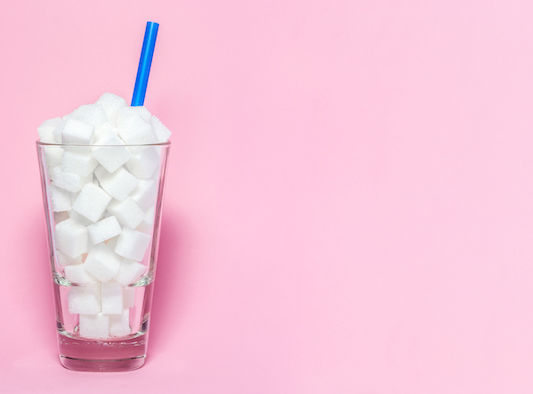
USDA recommended intake of sugar
Although there is no daily recommended intake for sugar, the Dietary Guidelines for Americans recommend limiting calories from added sugar to 10% of daily intake. For most American women eating a 2,000 calorie diet, this would mean 50g of sugar a day.
The American Heart Association, however, recommends only half of that, about 24g a day.
And, interestingly, the Scientific Advisory Committee which proposed the recommendations for the Dietary Guidelines for Americans recommended limiting added sugar to 4-6% of daily caloric intake. This would mean a mere 4.5-9g of added sugar a day!
Compare these recommendations to the fact that the average American consumes 71 grams of sugar each day!
Added chemicals and preservatives
Shockingly, there are approximately 10,000 chemicals that can be used directly or allowed to be present in food. Even more shocking perhaps is the fact that the FDA has not thoroughly reviewed them all for safety.
Researchers are just beginning to understand the impact some of these chemicals and preservatives are having on our gut health.
Anything we eat directly impacts our gut microbiome. We can eat foods that enrich it, resulting in eubiosis, or we can eat foods that negatively impact it, causing dysbiosis. Consumption of processed foods disrupts the balance of our gut microbiome and can lead to inflammatory bowel disease, celiac and a host of metabolic disorders.
Processed meat
One really big culprit when it comes to harming our overall health is processed meat including bacon, sausage and lunch meats. High heat, salt, smoking and chemical preservatives like nitrates and nitrites react with our body in dangerous ways.
Several studies have linked highly processed meats to cancer and cardiovascular heart disease. One study found eating just 5 oz of processed meat each week increased the risk of cardiovascular disease or morbidity by nearly 50%. That’s just a few slices of lunch meat or bacon each week!
The World Health Organization’s International Agency for Research on Cancer has deemed processed meats as carcinogenic, meaning they are potentially cancer causing foods. Processed meats are linked to breast, prostate, colorectal and pancreatic cancers.
A study published in The American Journal of Clinical Nutrition found processed meat consumption to increase the risk of dementia, Alzheimer’s disease and vascular dementia.
Artificial sweeteners
Another major culprit is artificial sweetener. Many of us know we want to avoid artificial sweeteners like aspartame or sucralose, but there are new substitutes on the rise. New “zero sugar” foods contain sweeteners like allulose, stevia or monk fruit, which are allowed to be called natural products despite being highly processed. These may impact the gut microbiome, cause inflammation and affect our taste sensors.
How did we get here?
It wasn’t so long ago that processed foods were the exception. Think back to the way our great-grandmothers cooked from scratch with simple ingredients. Since then, there has been a dramatic shift in what foods we eat and how they are prepared. Let’s take a look at some of the ways our food sources have changed over the past several decades…

The 60s
- High fructose corn syrup is created which lowers the cost of food production
- The age of advertising drives up the consumption of sugars
- Gatorade is invented for the University of Florida football team
The 70s
- Americans are spending more time watching TV and are starting to get heavier
- The first Starbucks opens
- The rise of the drive-thru: fast food becomes a multi-billion dollar industry
The 80s
- Dietary Guidelines for Americans are released
- Industry responds with light- and low-calorie food products
- Most American households have a microwave and processed meals are on the rise
The 90s
- Energy bars and fortified drinks are introduced
- Fat deemed harmful. High demand for low-fat foods
- Low-fat processed foods are marketed as a result
The 2000s
- Artificial sweeteners are a booming business
- Organic becomes big business
- Obesity rates sharply rise, especially among youth
It’s no secret that adult obesity has been on the rise over the past 30 years. In fact, from 1990 to 2016 obesity rates almost doubled. Research has recognized a correlation between the increased intake of added sugars and this rise in obesity. Recent research has shown the cumulative effect of increased sugar consumption over time has led to the rise in adult obesity. See figure below.
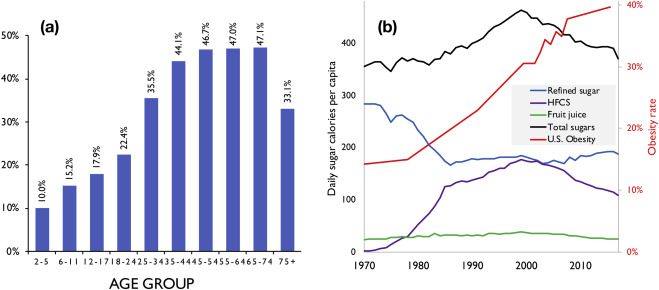
According to a historical analysis of the sugar industry and coronary heart disease research published in the JAMA Internal Medicine by University of California professor Cristin Kearns, the sugar industry has been influencing science and federal policies since the 50s. Downplaying the risks of sugar led to the low-fat craze of the 90s which led to even more processed foods.
Remember SnackWell cookies and Wow! fat free potato chips with that additive olestra that caused diarrhea and leaking bowels? They’ve since been discontinued but serve as a powerful reminder that Big Food does not have our health and wellbeing in mind.
Understanding the power of the food industry and the way they have shaped our environment is the important first step in learning how to take back control of our health and what we eat.
How do we loosen the grip of Big Food and make healthier choices?
Become a savvy consumer
Food manufacturers use deceptive labeling to help sell their products. Marketers want you to think you are making healthy choices using the following claims, but buyer beware! Learn the following signs that hidden ultra-processed ingredients are present so you can make better choices. Ingredients and label claims to watch out for include:
- Multi-grain: Sounds healthy but might just be a mix of highly refined grains
- Made with whole grains: Sounds like a good choice, but may actually be refined grains with only a pinch of whole grains
- No Trans Fat: Sounds like there’s no trans fat, right? Wrong. These products could include up to 0.5g of trans fat. Check for words in the ingredients like hydrogenated oils or shortening.
- Sugar Free: A “sugar free” label actually means the product has less than 0.5g of sugar per serving. So a few servings of these “sugar free” products can quickly add up to a lot of sugar! Plus, they might include those troublesome sugar alcohols like mannitol, xylitol or sorbitol.
- All Natural: Sounds good but officially there is no formal definition of the term “natural.” It just means that nothing artificial was added in production and the food was minimally processed. It could still be genetically modified or produced with pesticides. It definitely does not indicate that the food is a healthier choice.
Buy whole foods
Shop the perimeter to find foods that are either not processed or have been minimally processed. Think of the produce section, the meat section and the refrigerated and frozen sections.
But buyer beware! It’s easy to be fooled even here. An item like half and half which you would expect to have only cream and milk as ingredients might also contain disodium phosphate, sodium citrate, sodium phosphate, whey protein concentrate or carrageenan, a controversial additive used as an emulsifier that has been linked to gut inflammation, Crohn’s disease and ulcerative colitis.
Read the ingredient label and look for foods with minimal ingredients that you recognize as whole foods.
Make some simple swaps
Don’t be fooled by marketing! Remember, you have the “power of the purse” and collectively we can tip the scales of the food industry with our choices.
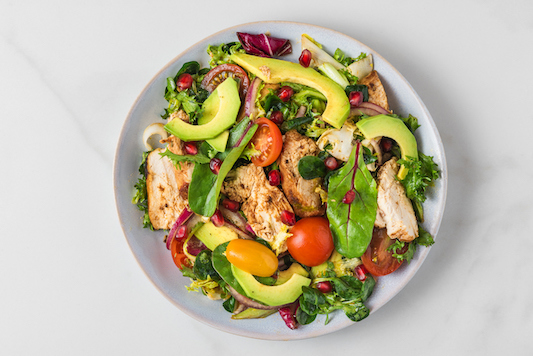
- Rather than purchasing lunch meat, broil or grill some chicken or steak, slice it up and have it on hand throughout the week. Use it to make a sandwich, add some protein to your salad or for an easy snack.
- Instead of using conventional bottled salad dressing which usually has unhealthy oils high in Omega-6, added sugar, chemicals and preservatives, make your own from scratch using extra virgin olive oil, spices, vinegar and lemon.
- Supplement your diet with Omega-3 rich sources like ground flax seeds, fish oil and grass fed animal products.
- Read the labels to avoid sneaky added sugars.
- Instead of yogurts with added sugar or artificial sugar, try adding frozen fruit to plain strained Greek yogurt. As the fruit thaws, you’ll find a consistency similar to “fruit on the bottom” yogurt.
Simple changes result in big benefits for your health
An encouraging research study was recently conducted highlighting the positive effects of reducing highly processed foods in our diet.
The study took 20 patients and gave them a highly processed diet for 14 days. They then gave them an unprocessed diet for 14 days. Both diets were matched in calories, sugar, fat, sodium, fiber and macronutrients. Participants were told they could consume as much or as little food as they wanted.
The results showed that the participants ate 500 more calories on the highly processed food diet and gained weight. Conversely when placed on the unprocessed foods diet the participants lost weight, had a reduction in cholesterol and a balance of hunger-related hormones. They experienced a drop in their levels of ghrelin, the hunger hormone, and an increase in PYY, an appetite suppressing hormone.
Although the study was small and scientists were unclear as to exactly why the unprocessed versus ultra-processed foods caused such different effects, the results are encouraging.

14-Day processed food detox: give it a try!
Give yourself a 14-day processed foods detox! Start by ridding your environment of processed foods and replacing them with healthy whole food choices so you can set yourself up for success.
- Go through your pantry and toss anything processed including chips, cookies, crackers, cereal and most snacks. Check the labels on things like pasta sauce, soups and rice. Keep canned beans, whole grain rice, vegetables, nuts, potatoes and garlic.
- Do the same for your fridge. Be sure to check labels of yogurts, salad dressings, shredded cheese, coffee creamers and condiments. Keep the whole foods like milk, eggs, cheese, whole meats and all those good fruits and veggies.
- Don’t forget the freezer! Toss the chicken fingers, pizzas, frozen meals. Keep the frozen veggies and fruits.
Shop the perimeter of your grocery store and stock up on whole foods to replace what you’ve tossed.
It’s not going to be easy to give up the processed foods we’ve all become attached to but it’s so much easier when they aren’t within reach!







